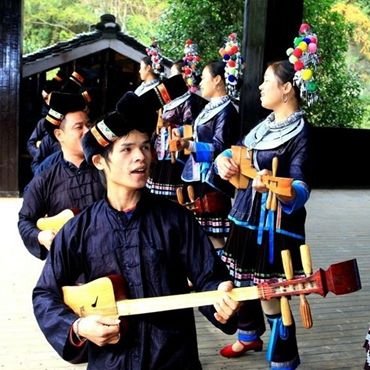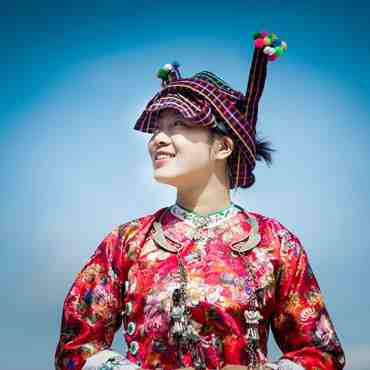Eating in Xishuangbanna
Yunnan Food Briefing
Yunnan cuisine is distinguished by its extensive ingredient selection and diverse flavors, with particular expertise in preparing wild delicacies and freshwater delicacies.
Yunnan dishes are celebrated for their mastery in cooking mountain treasures, freshwater fish, and vegetables, characterized by tender textures, naturally sweet undertones, tangy-spicy notes with mild numbing sensations, and rich savory profiles. These robust flavors cater to the palates of Yunnan's multi-ethnic population, forming a distinctive culinary identity.
The cuisine of Xishuangbanna stands as a highly representative exemplar within Yunnan's culinary traditions. It is characterized by four distinct flavor profiles: aromatic, spicy, bitter, and sour. This unique culinary tradition reflects both its tropical environment and Dai ethnic culture, creating a fascinating gastronomic experience deeply rooted in local ecology and traditions.
The region's barbecue culture stands out for its extraordinary diversity, where virtually any edible ingredient – particularly meats – finds its way onto charcoal grills. These street-side delicacies are often wrapped in lemongrass bundles, infused with wild herbs like coriander, mint, and cilantro, then spiced with fiery bird's eye chilies. What makes these grilled specialties truly exceptional is their commitment to natural ingredients: free-range "tea-flower chickens" (small native breeds), heritage pork raised without hormones, and wild-foraged seasonings. Slowly charred over wood embers, the resulting fusion of natural fats and aromatic herbs creates unparalleled flavors.
Spiciness dominates Xishuangbanna's culinary landscape, permeating grilled dishes, cold salads, and soups with intense heat. The local "bird's eye chili" (小米辣) – alongside green and black chili varieties – serves as the primary heat source, scientifically explained as an appetite stimulant in the tropical climate. Among spicy specialties, "pounded salads" (舂凉菜) hold particular cultural significance. Vendors prepare these using green papaya or yellow cucumber pounded in wooden mortars with chilies, salt, celery, lemon, and sugar – though the intensely spicy-sour green papaya version remains a local's challenge few outsiders can withstand.
To counterbalance the fiery heat and prevent inflammation from frequent spicy grilled foods, Dai cuisine ingeniously incorporates bitter elements. The most iconic example is "niu sa pie" (牛撒撇), a medicinal delicacy featuring minced beef blended with filtered bovine bile juice, chives, aromatic herbs, and spices. Served as a dipping sauce for rice noodles or beef slices, this bitter condiment transforms into a sweet-aftertaste medicinal dish through precise herbal combinations.
Sourness completes the flavor quartet, with lemon emerging as the quintessential seasoning. From tangy tomato and bamboo shoot dishes to signature sour bamboo shoot stews with chicken or fish, Xishuangbanna's acidity derives entirely from natural fermentation rather than artificial additives. The Dai people's preference for lemon extends beyond flavor – its enzymatic properties aid digestion, while antibacterial qualities and skincare benefits (from lipid reduction to skin purification) make it both a culinary and wellness essential. This harmonious balance of flavors not only satisfies palates but also represents an ancient dietary wisdom adapted to tropical living conditions.
The cuisine's foundation in locally sourced, minimally processed ingredients – from free-range poultry to wild herbs and traditional fermentation methods – creates a distinct food culture where every bite tells a story of ecological adaptation and ethnic tradition. Through this intricate interplay of flavors, Xishuangbanna's culinary tradition offers more than mere sustenance; it presents a living dialogue between humans and their environment, preserved across generations in every spicy, sour, bitter, and aromatic mouthful.
Famous Local Food
Famous Local Dishes
Sour Bamboo Shoot Chicken Stew (Suansun Zhu Ji 酸笋煮鸡)
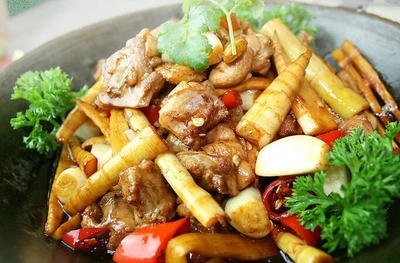
Sour Bamboo Shoot Chicken Stew is a classic Dai ethnic dish. The preparation involves first boiling sour bamboo shoots thoroughly in a pot, then adding prepared chicken to cook together until the meat becomes tender. Once the chicken is fully cooked, it is removed from the pot. Next, seasonings such as chili peppers, scallions, and ginger are stir-fried in the pot until fragrant. The sour bamboo shoot and chicken broth is then poured back into the pot for a quick reheat before serving.
The dish boasts a uniquely tangy and spicy flavor that is both refreshing and appetite-stimulating. While the distinct aroma of sour bamboo shoots may initially seem unusual to those unfamiliar with it, most who try the dish grow to love it. The sour bamboo shoots play a key role in balancing the richness of the broth, cutting through the greasiness and creating a harmonious taste.
This dish exemplifies the Dai culinary tradition of combining bold, contrasting flavors to create memorable and satisfying meals.
Lemongrass-Grilled Fish (Xiangmao Kao Yu 香茅烤鱼)
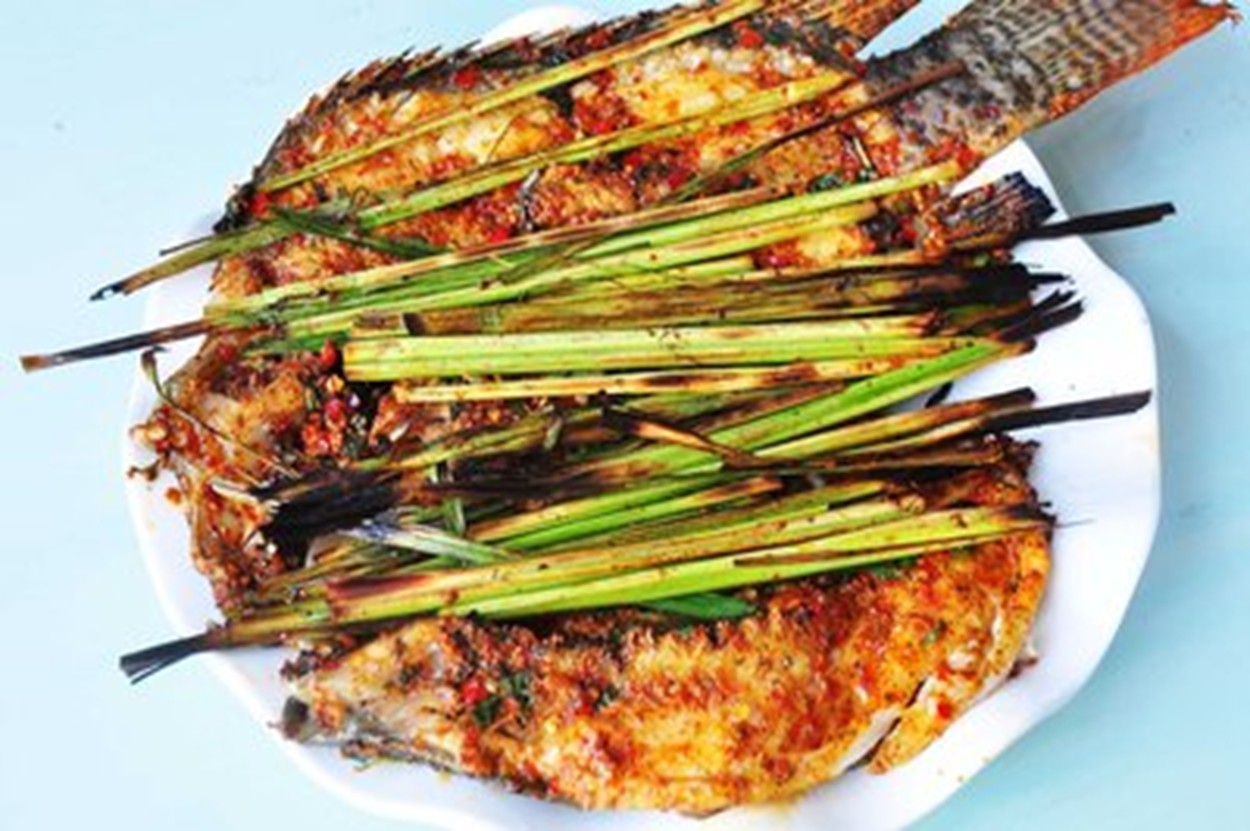
Lemongrass-Grilled Fish is a standout dish in Dai cuisine, renowned for two distinctive features. First, the fish is sandwiched between locally grown fresh bamboo strips and grilled over an open flame, infusing it with both the smoky aroma of roasted meat and the fresh, earthy fragrance of bamboo. Second, the dish incorporates lemongrass and cilantro, abundant in Xishuangbanna's tropical rainforests, which lend a uniquely citrusy herbal aroma.
The most iconic element lies in the fish's belly, filled with the Dai's special condiment—"Tomato Nanmi" (a traditional Dai fermented tomato-based sauce). Lemongrass, a subtropical herb with a natural lemon-like fragrance, is prized for its digestive benefits and its ability to refresh the mind. The Dai people particularly favor it as a seasoning. To prepare the dish, seasoned carp or tilapia is tightly wrapped with lemongrass stalks, then slow-grilled over charcoal embers until perfectly cooked. The result is tender, succulent fish with an extraordinary aroma that captivates the senses.
This dish embodies the Dai culinary philosophy of harmonizing natural flavors and textures, showcasing their deep connection to local ingredients and traditional techniques.
Chicken Porridge (Jirou Zhou 鸡肉粥)
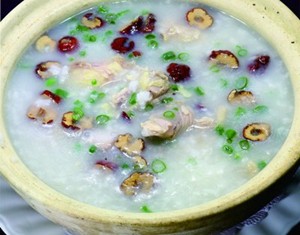
Chicken porridge is a popular traditional dish made by the Hani people, which can be served as either a staple food or a side dish. Chopped chicken is stewed with rice along with a small amount of ginger, chili, aniseed, salt, and lard until the rice and chicken are thoroughly cooked.
Fish Soup with Cobblestones (Eluanshi Yu Tang 鹅卵石鱼汤)
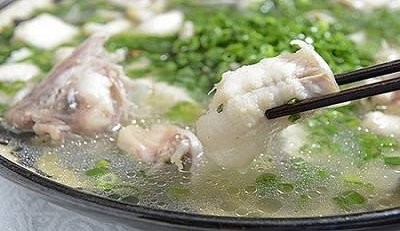
Fresh Fish Soup with Cobblestones is a masterpiece of the Bulang ethnic group, and its preparation is somewhat complicated. First, river cobblestones are toasted in a fireplace until red-hot. Then, the heated cobblestones are placed into a pot with clean water and fresh fish. With the aroma of the toasted cobblestones, the soup tastes amazingly refreshing and delicious.
Famous Local Snacks
Bee Pupae Sauce (Feng Yong Jiang 蜂蛹酱)
Bee Pupae Sauce, a unique delicacy from Xishuangbanna, Yunnan, is renowned for its sweet, umami flavor and exceptional nutritional value. Primarily used as a dipping sauce, it is crafted from honeybee or wild bee larvae. To prepare, the pupae are gently squeezed to extract their juices, finely minced, and mixed with roasted chili flakes, wild Sichuan pepper powder, fragrant knotweed, and other seasonings. The mixture is then blended with the extracted pupae juice, seasoned with salt, and served. This sauce, celebrated for its fresh sweetness, is traditionally paired with raw vegetables for dipping.
Bee pupae cuisine reflects Xishuangbanna's tradition of utilizing natural, protein-rich ingredients. These dishes highlight the region's innovative approach to blending textures and flavors while preserving the nutritional benefits of its unique resources.
Tomato Nanmi (Fanqie Nanmi 番茄喃咪)
Tomato Nanmi is a traditional ketchup-like condiment made from tomatoes and other seasonings. After being cooked and peeled, the tomatoes are pounded into pieces and thoroughly pestled with shallot, ginger, coriander, chili, and salt. Sour, spicy, and slightly sweet, it serves as a good appetizer and aids digestion.
Recommended Restaurants
For your reference, the following are the restaurants rated most popular by the locals:
Manfeilong Grilled Chicken (Man Feilong Kao Ji 曼飞龙烤鸡)
Address: 3-115 Jingfa Village, Gaozhuang Xishuangjing, Mengle Avenue, Jinghong City
Description: Specializes in Dai-style charcoal-grilled chicken with crispy skin and tender meat, served with homemade dipping sauce. Must-try dishes include pineapple sticky rice and lemongrass-grilled fish. Bamboo-decorated dining space offers authentic ethnic vibes.
LuoLuo Café (Luoluo Kafei Guan 啰啰咖啡馆)
Address: Shawan International Plaza, Mengle Avenue, Jinghong City
Description: A beloved local dessert café famous for "Sleeping Coconut" shaved ice with mango and coconut milk. Also serves spicy papaya chicken feet and refreshing lemon jelly noodles.
Kumari Nepalese Restaurant (Kumali Niboer Canting 库玛丽尼泊尔餐厅)
Address: Building 20, Jinglan Village, Gaozhuang Xishuangjing, Jinghong City
Description: Authentic Nepalese cuisine with must-order butter naan and chicken curry. Masala chai offers bold spices, while the terrace provides views of the bustling night market.
Yang Yang Snacks (Yangyang Xiaochi 杨杨小吃)
Address: Near ManTing Park, Menglong Road, Jinghong City
Description: A humble gem known for "Fish in Lettuce Wrap"—crispy tilapia with peanut sauce. Pair it with sour bamboo shoot rice noodles and passionfruit juice.
Mengyang Grandma's BBQ (Mengyang Laonai Shaokao 勐养老奶烧烤)
Address: Manzhang Village, Mengyang Town (near Wild Elephant Valley), Jinghong City
Description: Open-air Dai-style BBQ run by locals. Skewered beef and crispy pork skin grilled over fire, dipped in tangy fermented sauce—perfect after visiting Wild Elephant Valley.
Mianli Burmese Eatery (Mianli Miandian Xiaochi 缅丽·缅甸小吃)
Address: Shawan International Plaza, Mengle Avenue, Jinghong City
Description: Burmese-style specialties like banana-leaf grilled fish and coconut noodle soup. Don't miss "Golden Baba"—crispy fried banana fritters with sticky centers.
Dai Manor (Dai Zhuangyuan 傣庄园)
Address: No. 18, Galan Middle Road, Jinghong City
Description: Upscale Dai cuisine featuring bamboo-tube chicken and sour bamboo shoot beef stew. Traditional peacock dance performances enhance the dining experience.
Bing Bing Liang (冰冰凉)
Address: Shawan International Plaza, Mengle Avenue, Jinghong City
Description: A 30-year-old dessert shop famous for spicy lemon jelly noodles and "Pao Lu Da" (coconut sago dessert). Ideal for beating the tropical heat.
Aka Village Stall (Aka Zhai 阿卡寨)
Address: Mekong Starlight Night Market, Gaozhuang Xishuangjing, Jinghong City
Description: A night market star offering Hani-style grilled pig brain and bamboo worms in banana leaves. Adventurous eaters will love its bold, earthy flavors.
Yun Wei Fang Chicken Rice Noodles (Yunwei Fang Tuji Mixian 云味坊土鸡米线)
Address: No. 4, Menghai Road, Jinghong City
Description: Rich chicken broth simmers for 8 hours in this cross-bridge rice noodle haven. Generous toppings and free refills of pickles and crispy pork skin make it a local favorite.

